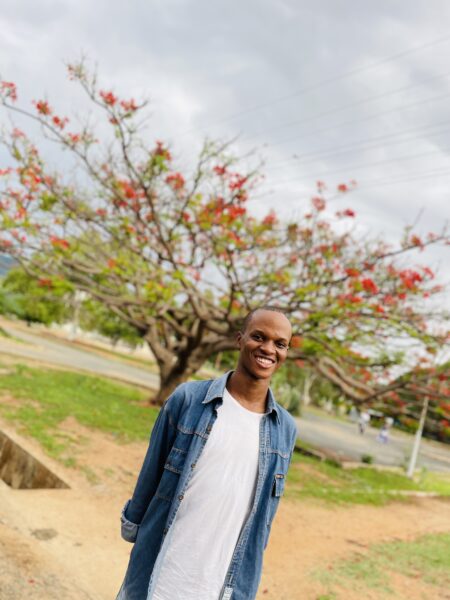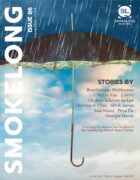The piece begins with a taboo—a daughter contemplating eating her father. She’s filled with shame, yet by the end of the piece, there’s movement. In what ways does this piece play with taboos and use war to comment on their breakdown?
The crux of this piece is to comment on one of the ways in which war dehumanizes us. By playing on her personal, internal conflict, I try to remind the reader that these urges to eat her father are not brought on by her own innate psychopathic tendencies, but by the nature of her reality as a starving, nearly deranged woman in an active warzone.
I think it is an innate human instinct to make choices that ultimately benefit us, even if it is at the detriment of others. So, for Nnodim, her situation begs the question of self-evaluation: Are her actions—although taboo—done with malicious intent? Or are they survival instincts? Does the latter influence the former? How far is she willing to go to live?
I hope she finds her answer, whatever choice she makes.
The tension of the story comes from the longing to have agency and the horrible ways that being a war victim takes that away. But the narrative voice, for the most part, has a reserved quality to it which allows the tension to leap off the page. Tell us about the way suspense and tension are woven into this piece.
My friend once told me, in a surprising flux of philosophical insight, “Writers do not create stories. These stories simply allow themselves to be told by certain people.”
These words have since changed my perspective on how I view storytelling and the unique forms they take.
Any manifestation of artistic tension in this piece is entirely as a result of the story’s will to manifest itself in that manner. The use of tension and suspense in this piece was secondary to my writing. I was primarily focused on the language, and the ways in which I could make the piece become as fully formed in as little words as possible. The tension and suspense tied rather beautifully into the overall language, but ultimately, they were done with very little intention. If anything, they were done by the story itself.
Another element of the story is the way it treats distance, both narratively with the voice and literary with the physical distance of the characters or the distance of time and memory. Tell us more about the role of expansion and contraction of distance in this piece.
Distance serves a primary role in this story, most notably, the emotional distance between Nnodim and her father, “She can never tell what it is he is thinking these days ….”
I think I’ve always wanted to comment on the ways in which space can exist both as a physical presence and as a mental divide between people, and so the distance between Nnodim and her father plays the role of illuminating their new estrangement. This is why I think the story’s ending was very clever, because it is hunger, and not love, that prods her to close the distance between them.
There’s that one sentence about that one particular soldier and how spotting him would be a small victory. There’s so much restraint in that sentence and a hint about a whole other narrative. Tell us about the way the unsaid works in this piece and how what’s left off adds to what’s said.
This piece was largely (if not wholly) inspired by the stories my father told about his days as a soldier in the Nigerian-Biafran civil war. Having fought on the Biafran side, my father once told me of the day his platoon stumbled upon a cornfield littered with the bodies of over twenty fallen Nigerian soldiers. He spoke about his platoon’s jubilance at the sight, and I remember thinking how macabre it was for them to celebrate death in that manner—even if it was the death of an enemy. Nnodim was a means for me to try and understand that emotion.
A lot of things are left unsaid in this piece, mostly due to the limiting nature of microfiction. For this reason, I had to make certain compromises; by subtly alluding to the wider, unspoken reaches of the story, I gave the reader agency to fill those plot voids for themselves. And I think it’s quite beautiful because it invites the reader into the piece and accords them the propriety to also become writers themselves.
The ending of the piece, that last sentence is surprising. Tell us more about how you think about endings and write them.
I knew from the onset that I did not want to make the choice for Nnodim, and I think knowing this also meant that I knew this story would inevitably end at a crossroad. The intent behind my decision to abruptly cut it off was to allow the story to live on beyond itself. To let the reader ponder: Does she eat him? Or does she hold back?
Ultimately, I left the story’s true ending to Nnodim.



 The SmokeLong Grand Micro Contest (The Mikey) is now an annual competition celebrating and compensating the best micro fiction and nonfiction online.
The SmokeLong Grand Micro Contest (The Mikey) is now an annual competition celebrating and compensating the best micro fiction and nonfiction online.